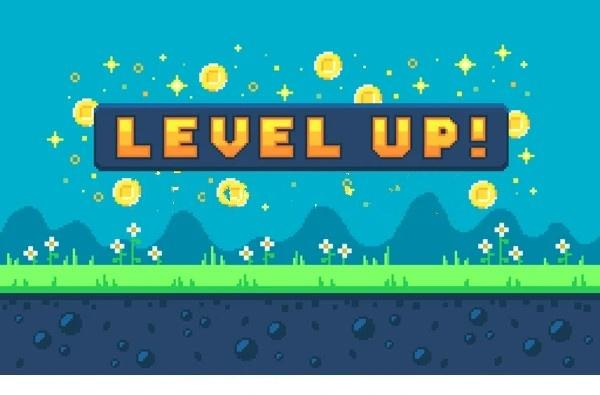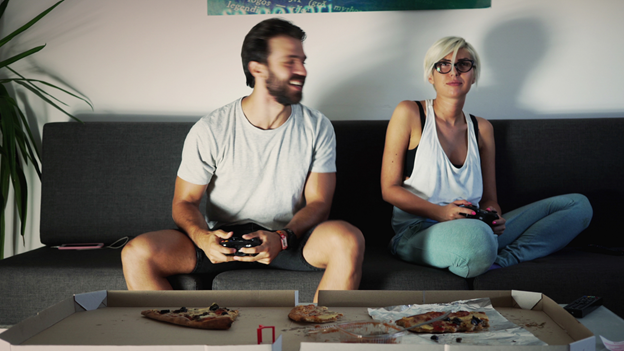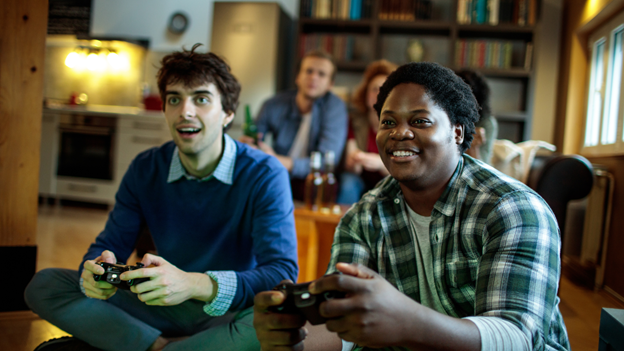What Makes Video Games So Addictive?

From puzzles games to first-person shooters and MMORPG’s, there are so many diverse video game genres out there. Surprisingly, despite the variety in games their addictive qualities tend to follow similar paths to keep players hooked. Obviously, we can’t name every addictive feature of every single video game. But, we will provide you with the psychology and human motivations that video games use to keep us playing, with some examples along the way.
Content
Escapism

This is definitely one of the more common reasons for playing video games and can vary in severity. Some people want a small escape from reality to relieve stress, while others use it to immerse themselves and avoid big problems in their lives. Video games such as MMORPG’s are notorious for creating a place for gamers to escape.
Games such as World of Warcraft give the players the opportunity to create an avatar and live vicariously through their eyes. Players can meet up with friends to complete quests, train skills, make money and acquire the best gear. The freedom to venture through a vast land and interact with it however they please can make people prefer it to the hard life they live outside of the game.
Most MMORPG’s have roleplaying servers where people embody the purpose of their avatar and interact with one another as if they truly are their character. Although it may be a fun pastime for some, for many this offers the opportunity to run from the emotions they are feeling in the real world.
However, MMORPG’s aren’t the only type of game responsible for facilitating escapism. Games that require high levels of concentration like MOBAs, fighting games and first-person shooters all provide an excellent means of escape. The dexterity and focus that these games require to play at a certain level can put the players into such a deep, trance-like state that they become oblivious to everything else.
Video games have been shown to reduce the effects of negative emotions like fear, sadness and anger. Hence many gamers are left using their favourite games to run from these emotions. Often when they do not learn to healthily deal with their emotions it can lead to overwhelming feelings of anxiety when they have to experience them without video games.
Rewards & Measurable Growth

Gaming provides people with a constant stream of achievable goals. When we play video games, it’s always to complete a level, unlock new content or improve our rank or high score. Persistent rewarding the player massively contributes to the development of video game addiction by tampering with the brain’s reward system.
When we receive rewards from playing video games it causes the brain to release dopamine, a neurochemical that makes us feel good for accomplishing something. When a person plays video games for extended periods of time the constant release of dopamine starts to desensitize the brain’s receptors to dopamine.
This, therefore, results in the brain requiring more dopamine in order to feel the same level of satisfaction that we used to. So how do we achieve this? We play more video games of course! Gaming sessions become longer in an attempt to get our fix and before we know it we are in the midst of a video game addiction.
But, striving for accomplishment is an innate part of the human condition and is what has gotten us to where we are now. If we think about it we always praise hard work and revere people in society who have achieved difficult tasks. Video games somewhat exploit this aspect of our psychology by providing a route of little resistance.
For someone more vulnerable like a child with video game addiction. This can be really harmful to their motivations to accomplish things in life. Why would I want to study hard to get good grades in school? When I can invest this energy into Fortnite and unlock the new skins on the battle pass. Video games condition us to get used to this instant gratification in life and skew our concept of hard work and reward.
Should this remain untreated it can move on into adolescence and adulthood preventing addicted gamers from reaching their full potential in the real world.
Competition

This is another aspect of video games that draw in those of us that love to be the best. Almost all of the popular multiplayer games in the modern gaming era are competitive games. Meaning that gamers can play against one another to climb through the ranks to reach the top of the ladder. But sometimes it doesn’t stop there as many players are often recruited for pro-Esports teams to compete on the big stages and make a career out of it. But, more on this later.
Gaming is an easy way to provide a safe form of competition. We can feel the same nerves, high intensity and glory of victory from competing in a video game safe and sound in our bedrooms. Which, makes those who love competition resort to playing. It’s not surprising that many celebrities and combat sports athletes enjoy gaming for this reason as wanting to be the best is part of their nature.
Gamers with the drive to beat their opponents and can’t stand losing, cause them to invest long hours into practising to become improve their skills. Using their new and improved tactics to beat their opponents is often met by rewards and again we are caught in a cycle.
Take the League of Legends ranked system for instance. To become better at the game, it does require lots of practice and experience in the game. Matches last an average of 30 minutes each so it’s easy to see how this can eat up all of a person’s time. But, those persistent enough will eventually improve and blitz through the ranks to become as good as they can be. However, at this point, it is safe to say that they are bordering on addiction with the amount of time and sacrifice of other areas of their life it takes to get there.
Making a career out of gaming is becoming more prevalent nowadays with universities offering scholarships to compete on Esports teams. This has led to young people in places such as South Korea having gaming addiction reaching a tipping point as competitive gaming is seen as a genuine way out of poverty.
The problem is that the chances of succeeding as a pro gamer are close to one in a million for the majority. Hence, leaving many young gamers who don’t make it with little but an addictive relationship with video games to show for it.
Unique Stimulation

Those who are addicted to video games often complain that everything else is boring except gaming. The reason that things appear this way is partially due to the dopamine hit they get from gaming. But also due to the different forms of stimulation that gaming can offer.
People use video games for a whole number of reasons. They can be used to relax and unwind in the evenings, to socialize and interact with friends or to concentrate and experience high adrenaline fun. The fact that people can access all of these things from the seat of their gaming chair makes them reluctant to want to do anything else. The barrier for entry is very low to play video games and hence it is far more appealing than other activities.
Social Interaction

Games don’t have to be multiplayer to be enjoyed with friends these days. Most gamers will meet up over communication apps like Discord, Skype or TeamSpeak to hang out and enjoy doing what they love most. The problem is that some people begin to prefer interactions through video games compared to real-life interactions.
Those who are shy or suffer from social anxiety can often find safety in the anonymity of online friends. However, it’s not just those who are shy that this appeals to as we are inherently social creatures. Therefore meeting up with real-life friends over discord to play video games can become the norm.
The problem with this is we need essential face to face interactions to improve our communication skills. Without these we are at a huge disadvantage in the world as talking to others is an inevitable part of life.
However, the social side of gaming does contribute to video game addiction as working together on most games is encouraged. For competitive games, the team with better communication always wins. Sometimes you and your duo partner on League just have great chemistry and makes you want to work together to climb through the ranks. Other times you’re raging at your team on CSGO for not making the correct play.
It’s clear that gaming is an important part of socialization for people in today’s climate, but when gaming with friends starts to take priority over those we love in real life then it can become problematic.
Loss Aversion

One important factor that keeps us playing video games is the cognitive bias they cause us to have. When we invest time and money into video games they often act as a symbol of our hard work. Take games like Runescape for instance where players can invest thousands of hours into an account and acquire all of the “end game” items. An account like this in the eyes of the player holds immense value and makes it difficult to give the game up.
Loss aversion refers to avoiding losing something of value and in this case, it’s the game or the game account. The rationale for gamers continuing to play typically states “All of the time and money I’ve invested into the game would have all been for nothing if I simply quit” Sadly this leads to players continuing to play to maintain the perceived value of their accounts as opposed to giving the game up and moving forward with other aspects of life.
We liken it to the analogy of trying to wear clothes that we have grown out of. The idea of trying to squeeze into old clothes that we own as an attempt to save money on them is a pretty ridiculous concept. So when we continue to play video games despite the negative effects it is having on us, it creates a defining moment for the addiction. Playing to maintain the value of the account when we are not actually gaining anything.
The time and money invested into gaming are not going to come back if we continue to play. Therefore it is important to move on as we have outgrown gaming.
How To Treat Video Game Addiction?

Video game addiction despite being a behavioural addiction means that it is entirely possible to overcome it if we take the correct steps. The main form of treatment used for someone suffering from video game addiction is cognitive behavioural therapy, which we will explain in a moment. But, it’s important to note that as well as in-person therapy we can use these practices and teachings in our own time to break our addictive thoughts.
Cognitive Behavioral Therapy
Also known as CBT, is a broad term that refers to changing the way we think in order to change the way we feel, act and perceive the world around us. Someone suffering from video game addiction usually has a lot of negative and addictive thoughts that cause them to play video games. Hence addressing these help to overall decrease addictive symptoms.
Those with video game addiction can also have underlying causes such as anxiety, depression or other comorbid mental health conditions that they use gaming to escape from. We always encourage that you seek help from a medical professional if you suspect there are underlying mental health conditions.
CBT’s efficacy has shown to be one of the leading techniques in treating the aforementioned mental health conditions especially gaming addiction. So, without any further ado. Here is a CBT exercise that we can use to get us started:
(Beginning of Exercise)
This one is all about reframing negative thoughts. Obviously, our addictive thoughts count as negative thoughts also so try to reframe these as well.
How we reframe a negative thought is to counter a negative thought with multiple positive ones as soon as we experience it. An important part is to note how much better it makes us feel for doing so.
For instance, let’s say you began to think “I have wasted so much time on video games it’s all I know how to do”. We need to counter this with 3 achievements we have made outside of gaming no matter how big or small they might be. It could be passing exams, securing a job interview or even a personal goal like finishing a book. Note how these things made us feel. Happy, motivated, accomplished?
If we begin to have negative thoughts like “I have no friends outside of gaming. I feel lonely.” We can quickly counter this with 3 qualities that make you a good friend outside of gaming. You could take pride in how caring you are, how you always make people laugh or even how you encourage their goals and aspirations. Again note how this makes us feel.
Whenever you begin to feel negative thoughts about your addiction begin to creep in, try to counter them as quickly as you can.
(End of Exercise)
Acceptance & Commitment Therapy
This falls under the umbrella term of CBT and is again one of the techniques that will be used to treat video game addiction in person with a therapist. The best thing about CBT practices is they are pragmatic and therapists will often set tasks, meditations and thought experiments to practice in your own time to help treat your addiction.
Here at The Mindful Gamer, our course provides many of these practices all in one place. So, what is ACT? ACT is a form of therapy that focuses on embracing our thoughts and feelings rather than fighting against them. When we fight against our negative thoughts it makes them harder to deal with. They make us emotionally exhausted and inherently dread having them.
By accepting their presence and continuing to move in the right direction we take away the additional pain and suffering that comes along with it. Hence making it easier to act in a way that we value. The commitment part refers to committing to actions that are consistent with your values.
When someone begins ACT exercises to treat their addiction they often work towards determining their values first. When someone knows what they value, these will help to guide them in the right direction no matter how they feel.
For someone that suffered from video game addiction, it is likely that they have lost touch with their values and the person that they would ideally like to be.So here is a quick ACT exercise to get us thinking about our values:
(Beginning of Exercise)
We recommend that you find a quiet place free from distractions to answer these series of questions about various aspects of your life and the person you want to be. It’s okay to not have an answer right away, and it’s also okay to come back to them another time. The importance of the activity is to get us thinking about our values and moving in the right direction.
Relationships – What sort of friend would you like to be? What sort of partner would you like to be? How would you describe your ideal friendship? What behaviours would you like to show towards your significant other? What kind of person would you like to be remembered as by your loved ones?
Job/Career – What career goals are most important to you? What is your ideal form of employment if one at all? What sort of professional relationships would you like to make? What qualities would you like to demonstrate as a worker?
Leisure – What activities outside of gaming do you find fun? What activities other than gaming would you like to do in your spare time? What excites you? What stimulates you? What relaxes you?
Take a moment to reflect on these areas or any other areas of your life that you might have been neglecting due to your gaming habits. The answers that you believe are right and how you want to be viewed, often help to give us a good idea of the characteristics we value. So be patient and answer what you can.
(End of Exercise)
Mindfulness
Mindfulness is also a part of all modern CBT practices as it has amazing results in treating a number of mental health conditions, especially addiction. Some of you might have heard of the term before as in recent years it has been growing in popularity.
Mindfulness is all about grounding ourselves and shifting our attention to the present moment. Regardless of what we are thinking, feeling or experiencing mindfulness teaches us to be in the present moment observing the sensations we are feeling without judgment. Inherently we are judgemental creatures so this is often the most difficult part about mindfulness. Our minds wander off into different places, tangents and have to persistently be brought back into the present moment.
The benefit of using mindfulness for video game addiction is that it helps us to not be overwhelmed by negative emotions. As we explained earlier in the article those who used video games as a means of escape often struggle to engage with their emotions. By practising mindfulness and shifting our attention away from these thoughts and into the present they don’t seem so daunting anymore.
Here is a mindfulness exercise to get us started:
(Beginning of Exercise)
Before we start the exercise we want you to know that most things we do in life, even the most mundane, can be turned into a mindfulness practice.
Here we are going to use the example of walking to work as one of our mindfulness practices. Don’t worry if you don’t walk to work. It can be any time where you have a short couple of minutes to walk from A to B.
Start by taking a deep breath inhaling in through your nose and out through your mouth. Shift your attention to how the air feels as it rushes in through your nostrils and into your lungs. Notice how the air feels cooler as it comes in and warmer as it exits your mouth.
Notice the rise and fall of your chest as you inhale and exhale. If your mind starts to wander to other places, gently bring it back to your breath.
As you are walking, notice how each individual step feels. Notice the patting sound of your shoes on the pavement and the soft cushion on the soles of your feet. Every time your mind starts to wander away, you can gently bring it back to each of your steps.
While you are walking, notice the weather around you. Notice, without judgment, the warm glow of the sun on your body or the cool breeze as it brushes past your cheeks. Notice the sounds and colours of the environment around you. The sounds of the trees rustling or the planes flying overhead. Notice the colours of the buildings that you walk past. When your mind starts to wander to make judgements, gently bring your focus back to your environment.
No matter if your mind starts to wander a hundred or a thousand times. Each time it happens, always move your focus back to the present moment. Your breath, your body or your environment.
(End of Exercise)
Hopefully, you find these exercises useful and give you some momentum in the right direction towards your goal of quitting or cutting down. If video games have been negatively affecting your life or you simply want to play a little less, The Mindful Gamer is always here to help.








